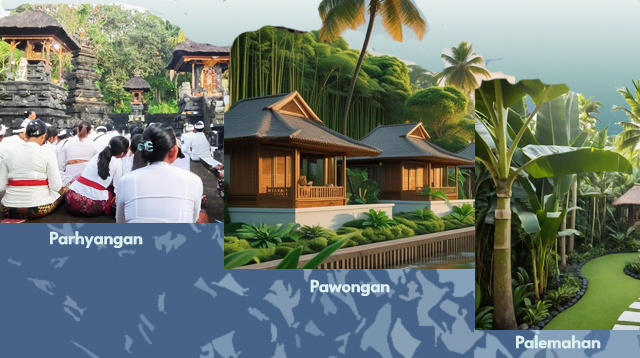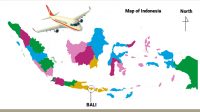BALINESE society is known for its rich culture, including its unique and profound Balinese philosophy of life, Tri Hita Karana. Literally, it means three sources of happiness. This philosophy is the foundation of their lives, teaching about the importance of maintaining balance and harmony between humans and God, fellow humans, and the universe (environment).
Understanding the Concept of Tri Hita Karana
Tri Hita Karana emphasizes the harmony of three main relationships: humans with God (Parhyangan), humans with other humans (Pawongan), and humans with the natural environment (Palemahan). This balance is believed to bring peace, prosperity, and happiness in every aspect of life. The three causes of such happiness are as follows:
- Parahyangan (spiritual aspect): A harmonious relationship between humans and God. This relationship is manifested through worship, religious ceremonies, and respect for Sang Hyang Widhi Wasa.
- Pawongan (social aspect): A harmonious relationship between humans and fellow humans. This relationship is manifested through an attitude of mutual respect, helping each other, and maintaining harmony in society.
- Palemahan (environmental aspect): A harmonious relationship between humans and the universe. This relationship is manifested through an attitude of preserving the environment, utilizing natural resources wisely, and respecting nature as part of life.
Implementation of Tri Hita Karana in Daily Life
The philosophy of Tri Hita Karana is not only an abstract concept, but is also applied in real life in the daily lives of the Balinese people. Here are some examples of its application:
Parhyangan:
- Balinese people diligently perform worship in temples, both in family temples, village temples, and larger or public temples such as Pura Besakih.
- Religious ceremonies, such as the Ngaben, Odalan, and Galungan ceremonies, are carried out solemnly and with full respect.
- Respect for nature is manifested through offerings and ceremonies related to nature, such as the Melasti and Tumpek Wariga ceremonies.
Pawongan:
- Balinese people uphold the value of mutual cooperation and helping each other in various activities, both in the family and in society.
- The attitude of mutual respect and appreciation for differences is highly respected, reflected in polite language and behavior.
- The tradition of deliberation and consensus is the basis for joint decision-making.
Palemahan:
- The subak irrigation system, which regulates the distribution of water for rice fields fairly and sustainably, is a real example of the application of the Palemahan concept.
- Balinese people maintain environmental cleanliness by not littering and caring for plants around their homes and temples.
- Utilization of natural resources is carried out wisely, by not exploiting nature excessively.
Besides, the tri hita karana is also applied in the layout of house compound, if the land area enables, into three areas:
- Parhyangan: this area is dedicated for sacred place or place of worship like family temple or the like. Commonly, it is located in the east or north-east or upstream area near the entrance gate. It is confined by temple surrounding wall
- Pawongan: is dedicated for housing or residence confided by wider compound wall. All house buildings are built in accordance with the layout mentioned in Asta Kosala Kosali palm-leaf manuscript, if land area permits.
- Palemahan: is the last area located in the backyard commonly taken advantage for waste processing, cattle and similar needs located outside the house compound wall
Tri Hita Karana in Bali Tourism
The Tri Hita Karana philosophy is also a tourist attraction in itself for Bali. Many tourists are interested in learning and experiencing firsthand how this philosophy is applied in the lives of the Balinese people.
Some examples of the application of Tri Hita Karana in Bali tourism:
- Ecotourism based on the preservation of nature and local culture.
- Spiritual tourism that invites tourists to get to know and feel the peace of Balinese spirituality.
- Cultural tourism that showcases the traditions and customs of the Balinese people.
By understanding and appreciating the Tri Hita Karana philosophy, tourists do not only enjoy the physical beauty of Bali, but also feel the depth of spirituality and harmony of the lives of its people. (*)










